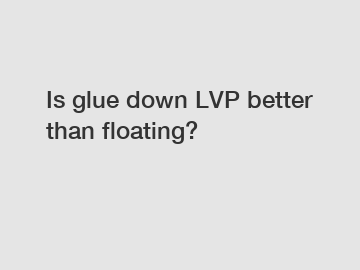Is glue down LVP better than floating?
Is Glue Down LVP Better Than Floating?
Luxury Vinyl Plank (LVP) is becoming an increasingly popular choice for flooring due to its durability, affordability, and wide range of design options. When it comes to installation, two common methods are glue down and floating. While both methods have their advantages, it is important to understand the differences between them to determine which is better suited for your specific needs and circumstances.
Glue Down LVP:

Glue down installation involves using adhesive to secure each individual plank directly to the subfloor. This method offers a number of benefits that make it a favorable option for many homeowners.
1. Enhanced Stability:
One of the main advantages of glue down LVP is its enhanced stability. By adhering the planks directly to the subfloor, they become less prone to movement or shifting. This is particularly beneficial in areas with heavy foot traffic or where furniture may be frequently moved around, as it reduces the risk of edges lifting or gaps forming between planks.
2. Sound Absorption:
Another advantage of glue down LVP is its superior sound absorption properties. When installed with an appropriate underlayment, the adhesive acts as a noise barrier, effectively reducing the transmission of footsteps and impact noise. This makes glue down LVP an ideal choice for multi-level buildings or rooms where noise reduction is important, such as bedrooms or home offices.
3. Moisture Resistance:
Glue down installation provides a more secure seal, making it highly resistant to moisture. This is especially important in areas prone to high humidity levels or potential water exposure, such as kitchens, bathrooms, or basements. By preventing moisture from seeping beneath the planks, glue down LVP helps preserve the integrity of the flooring and minimizes the risk of mold or mildew growth.
Floating LVP:
Floating installation, on the other hand, involves interlocking the LVP planks together without the use of adhesive. Instead, the planks "float" over an underlayment, providing numerous advantages that are worth considering.
1. Ease of Installation:
Floating LVP is generally easier and quicker to install than glue down. The interlocking mechanism allows for a simple snap-and-lock process, eliminating the need for messy adhesives or specialized tools. This makes it a popular choice for DIY enthusiasts or homeowners looking to complete the installation themselves.
2. Versatility:
Floating LVP offers greater versatility when it comes to installation over different types of subfloors. It can be installed over concrete, wood, or existing flooring, provided it is clean, dry, and level. This flexibility makes it a convenient option for renovation projects, as it eliminates the need for extensive subfloor preparation or removal of existing flooring.
Closing Paragraph:
In conclusion, the decision between glue down and floating LVP ultimately depends on several factors, such as the specific requirements of the room, personal preferences, and the expertise of the installer. Glue down LVP is known for its stability, sound absorption, and moisture resistance, making it particularly suitable for high-traffic areas and moisture-prone spaces. On the other hand, floating LVP offers ease of installation and versatility, making it a convenient choice for DIY projects or installations over different subfloor types. If you need further assistance in determining the best option for your flooring project, don't hesitate to contact us.
Keywords: contact us.
If you want to learn more, please visit our website wpc laminate flooring supplier, wpc floor additive, lvt flooring manufacturer in china.
80
0
0


Comments
All Comments (0)